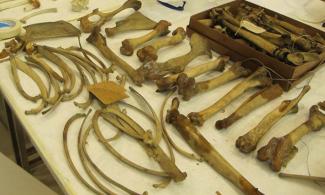Event information
Foyle Room, The British Library, London
Course leaders: Dr Lora Angelova and Dr Paola Ricciardi
This workshop is jointly organised by the University of Cambridge Museums (UCM) and the National Heritage Science Forum (NHSF). Participants will learn about a range of analytical methods, which can be used to learn more about the materials composition, history, original context and current conservation and storage needs of archaeological, archival and museum objects.
During the workshop, real case studies of heritage science research applied to a range of objects will be presented and discussed. Participants will be asked to contribute their experience of, or aspirations for, collaboration with heritage science researchers.
At the end of the workshop, participants will be able to:
- Frame research questions which scientific analysis can help answer
- Understand the differences between: imaging vs. point-specific; invasive vs. non invasive; destructive vs. non-destructive analyses
- Assess the suitability of a range of analytical methods for their specific research needs
- Evaluate the advantages and disadvantages of sampling objects, in line with ICON’s ethical sampling guidelines
- Develop a research proposal which includes scientific analysis of objects
- Identify suitable research partners or commercial collaborators to undertake scientific analysis of objects
The workshop is suitable for conservators, curators, early career scientists, collections managers, archivists and librarians working in museums, archives, libraries and historic houses.
The course language is English. Lunch and refreshments will be provided.
If you are staff, a student or member of a National Heritage Science Forum member organisation, you may be entitled to free place on this course. These free places are limited, so please email us as soon as possible if you are interested. A list of members can be found here.
For further information about the course or any other enquiries please email collectionscarecourses@museums.cam.ac.uk.
WORKSHOP LEADERS

Dr Lora Angelova is Head of Conservation Research and Audience Development at the National Archives, where she works to advance the Collection Care Department into an international centre for research excellence through leading wide-ranging scientific and conservation research projects, engagement with public and academic audiences, and supporting the wider archives conservation sector. Prior to joining The National Archives, Lora was a Conservation Science Researcher at Tate, where she worked on the Nanorestart project, evaluating nanotechnology-based cleaning systems designed to tackle the challenging treatments of modern and contemporary art. In 2013, Lora received a PhD in chemistry from Georgetown University and the National Gallery of Art, Washington DC, for her research on the design and application of polymer gels for surface cleaning heritage materials. Following her move to the UK as a Newton International Fellow she completed a year of research at the Melville Laboratory for Polymer Synthesis at the University of Cambridge, and a year at the Material Studies Laboratory, Department of History of Art, UCL. Alongside her work at The National Archives, Lora also contributes to the conservation science field as a book editor and conference organiser; she also leads workshops and consults on complex cleaning treatments.

Dr Paola Ricciardi works as a Research Scientist at the Fitzwilliam Museum, part of the University of Cambridge, where she is responsible, among other things, for the scientific aspects of the MINIARE research project. She holds a PhD in Cultural Heritage Science from the University of Florence (2008) and a Master’s Degree in Physics from the University of Rome (2003). Prior to joining the Fitzwilliam Museum in October 2011, she spent three years at the National Gallery of Art in Washington DC as the Samuel H. Kress post-doctoral Fellow in Imaging Science. Her main research interests include the technical analysis of cultural heritage objects, particularly with non-invasive analytical methods; the study of artists’ materials and techniques; and the transfer of knowledge between artists and craftsmen working in different media. She is keen to find new ways to communicate scholarly activities to ever broader audiences; in 2014, she co-wrote and produced a short film for the ‘Cambridge Shorts’ initiative (‘The Colourful Page’). She also helped design and produce content for the online research resource ‘ILLUMINATED: Manuscripts in the Making’, launched in July 2016.



